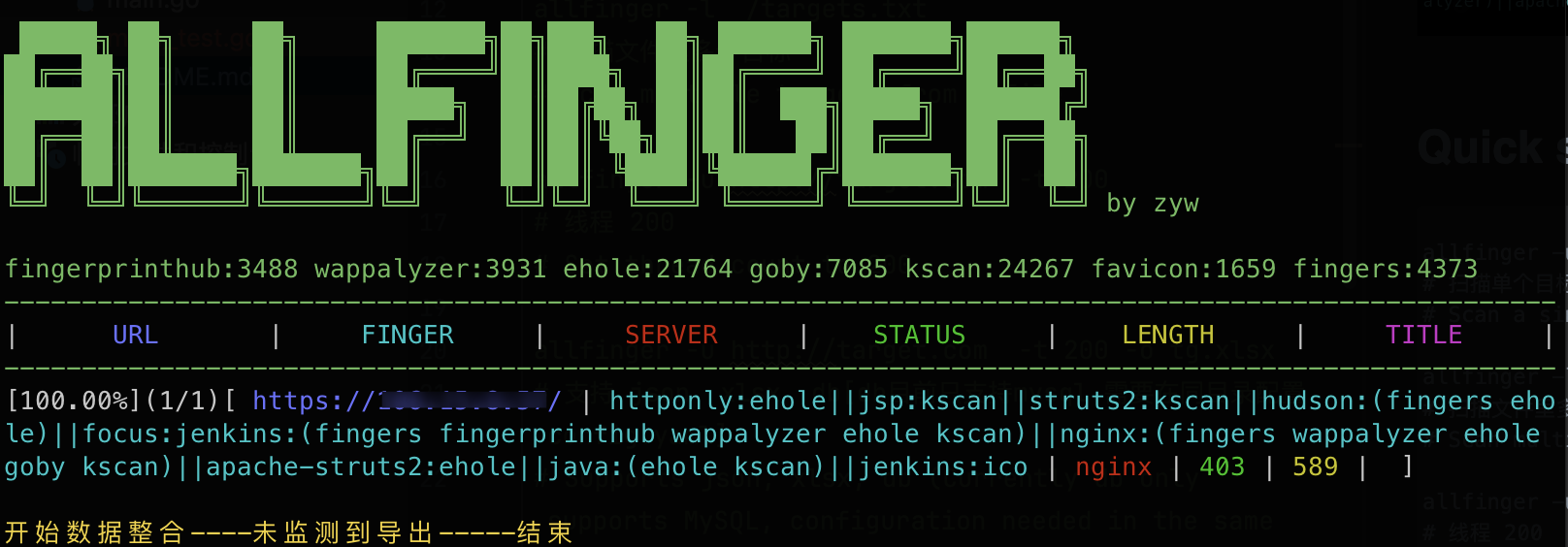Allfinger is a powerful tool for identifying and recording web fingerprints, featuring a database of over 60,000 fingerprints for fast and flexible scanning.
- 🚀 Extensive Fingerprint Database: Over 60,000 fingerprints for comprehensive coverage.
- ⚡ Fast Scanning: Efficient scanning speed to save time.
- 📂 Flexible Export Options: Supports multiple export formats to meet diverse needs.
Get started with Allfinger using the following commands:
allfinger -u http://target.com
# Scan a single target
allfinger -l /targets.txt
# Scan multiple targets from a file
allfinger -u http://target.com -t 200
# Set thread count to 200
allfinger -u http://target.com -t 200 -o tg.xlsx
# Supports export in json, xlsx, db formats (currently db supports MySQL only, requires config.yaml in the same directory)
allfinger -u http://target.com -m all
# Full engine scan; default is "fast" for quick scanning. "all" performs a full engine scan with higher CPU usage
allfinger -i 192.168.1.1/24,192.168.2.2
# Scan CIDR range| Parameter | Description |
|---|---|
-i, --cidr |
Scan IP range, e.g., -i=192.168.1.1/24,192.168.2.1 |
-h, --help |
Display help information |
-l, --local |
Read assets from a local file for fingerprint recognition |
-m, --mode |
Specify scanning engine, default is fast mode (6 engines) |
--mysql |
Specify MySQL export output |
-o, --output |
Output results, supports json and xlsx formats |
-p, --proxy |
Specify proxy for accessing targets |
-s, --slient |
Silent output |
-t, --thread |
Fingerprint recognition thread pool size (default 100) |
-u, --url |
Identify a single target |
Ensure a config.yaml file is in the same directory to support MySQL database:
database:
user: "root"
password: "123456"
name: "fingers"
host: "127.0.0.1"
port: "3307"And pre-create the SQL table:
CREATE TABLE `port_scan_results` (
`id` int(11) NOT NULL AUTO_INCREMENT,
`domain` text CHARACTER SET utf8mb4 COLLATE utf8mb4_unicode_ci,
`ip` varchar(45) NOT NULL,
`port` int(11) NOT NULL,
`protocol` varchar(10),
`tls` varchar(10),
`cdn` varchar(5),
`cdn_name` text CHARACTER SET utf8mb4 COLLATE utf8mb4_unicode_ci,
`time` TIMESTAMP DEFAULT CURRENT_TIMESTAMP,
PRIMARY KEY (`id`)
);